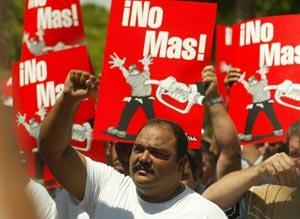For those of you who love it when Cuban-Americans' and Miami's reputation take a low blow,
this article is for you (emphasis and italicized commentary completely mine).
(prepare to deploy barf bags)Appeals court ruling underscores negative view of Cuban exile politicsBy Madeline Baró Diaz Miami Bureau
Posted August 22 2005
When a federal appeals court ruled recently that ardent anti-Castro sentiment in Miami-Dade County prevented five accused Cuban spies from receiving a fair trial, leading Cuban-Americans expressed outrage. But many outside of the Cuban-American community nodded their heads in agreement.
"[The impression is] that Dade County is like Alice in Wonderland where up is down, down is up," said David Abraham, professor of immigration and citizenship law at the University of Miami School of Law. "As soon as you drift out of Dade County you find that the Alice in Wonderland world ends at the Dade-Broward line."
OK, we're off to a fine start.Such perceptions are drawn from decades of tumultuous events in Miami-Dade. From bombings and assassinations militant Cuban exiles carried out in the
1970s and 1980s to strident demonstrations over Cuban performers, the community's outcry over Cuban castaway Elián González and
one-sided court battles in Miami-Dade courts in which judges awarded millions to people with claims against the Cuban government, Cuba has long been the enemy.
That last sentence is the only correct thing stated so far.In one famous case, the duped wife of a Cuban spy successfully sued the island's government for rape because her husband never revealed he was a Cuban agent.
Hooray for justice!The three-judge panel of the 11th U.S. Circuit Court of Appeals on Aug. 9 rejected the 2001 convictions of Gerardo Hernández, Ramón Labañino, Antonio Guerrero, Fernando González, and René González, ruling that the climate in Miami prejudiced the jury against them. Barring a successful appeal by federal prosecutors to the entire 11-member court, the five Cuban nationals will receive a new trial.
Hooray for justice!The judges said that seating an impartial jury was an "unreasonable probability because of pervasive community prejudice."
"The entire community is sensitive to and permeated by concerns for the Cuban exile population in Miami," the judges wrote.
Hooray for justice!The most serious charges in the spy case involved a tragic episode in Cuban exile history, the 1996 shoot down by Cuban MiGs of two small planes belonging to Brothers to the Rescue, known at one time for rescuing rafters and dropping leaflets over Cuba. The jury convicted Hernández of conspiracy in the deaths of the four men aboard the planes.
In their decision, the judges cited demonstrations and commemorations held during the trial as contributing factors to the unfair atmosphere.
Cuban-Americans take particular issue with that.
Damn right!"This is America," said Alfredo Mesa (
not according to some bozos, Mr. Mesa, just wait), executive director of the Cuban-American National Foundation. "Healthy debate -- protests -- are legal. There were people protesting outside the Michael Jackson trial. Why there are different standards when it comes to the Cuban-American community is what I don't understand."
Neither do I."Richard Nuccio,
special adviser to the Clinton administration on Cuba (
OK, place barf bags on face), said some people in other parts of the country are unsympathetic to Cuban-Americans because of the community's
single-mindedness.
Yeah, like, we don't like Fidel and people who conspire with him, comprende Mr. Nuccio?That became apparent during the battle for Elián, he said. The spy trial took place shortly after Elián returned to Cuba, something the appellate judges mentioned in their decision. The boy was reunited with his father, Juan Miguel González, following the U.S. Supreme Court's decision not to hear the custody dispute between González and his Miami relatives. That sparked protests in Miami-Dade streets.
Hooray for justice!"The kind of high-decibel extreme emotion, even the language that a lot of Cuban Americans used about the Elián case turned off a lot of people," said Nuccio, director of international programs at the Center for Civic Education in Los Angeles.
The writer forgot to add this to Mr. Nuccio's credentials - expert on Cuban-American behavior.
Mesa and others also were offended by the judges' mention of Miami-area bombings from three decades ago."They are talking about a situation that happened a long time ago," said television commentator Tomás Garcia Fuste. "Those practices … are no longer used today in Miami. We understand that it was not the right path.
Don't even bother Mr. Garcia Fuste, they're not listening. Besides, some think it still happens."Nuccio, however, pointed to the case of Cuban militant Luis Posada Carriles, who is awaiting an immigration hearing in Texas on charges he entered the United States illegally and
some in the Cuban-American community's embrace of him as evidence of twisted notions of justice in the community
S
since when did the opinion of some represent the entire community? Perhaps in Clinton-ese it makes sense. Posada, accused of violent acts that include the downing of a Cuban jetliner and the bombings of Havana hotels, came to Miami in March, months after being pardoned in Panama of charges stemming from an alleged attempt to kill Fidel Castro in the Central American country."You did get this impression that he thought he could go from exile in Central America to Miami and that would be … safe haven there," Nuccio said. "For people that are paying attention, I think it does give the impression that somehow the
Constitution and laws of the United States don't exactly apply the same way there." Mr. Nuccio, we are paying attention, and last time we checked, Mr. Posada is locked up in El Paso, TX, not drinking mojitos in Miami, Florida, US of A. The protests the day he was taken away were deafeningly silent.Madeline Baró Diaz can be reached at mbaro@sun-sentinel.com or 305-810-5007.
![[freedomtowernight_edited.jpg]](https://blogger.googleusercontent.com/img/b/R29vZ2xl/AVvXsEi-x7_mwi5EYyZJxpzNqsvkYATDseYTHIovP09YKrIctspB17DY_5s2AeackCCaZqX14NV-rcs5S81-anUoEkQcrbMqc9hATVpw0uU3hH1tyIbe0iq0Jfe5iTwGlJaoODZXAOt_Kg/s1600/freedomtowernight_edited.jpg)







![[yanomasnew.jpg]](https://blogger.googleusercontent.com/img/b/R29vZ2xl/AVvXsEjEh5xBwYB4BI84Cgkb-4HF_fhmRhKvr_04RHSZ1kySa9-x2qIDzPwZxsOPW8kY2PNWrqOcHIflfvAuq2h5T6bxOkEsPRPtC0eJX4vZAmquZw4-5-lxj2ijw7ygo-8WhjEPdEA2Hw/s1600/yanomasnew.jpg)


